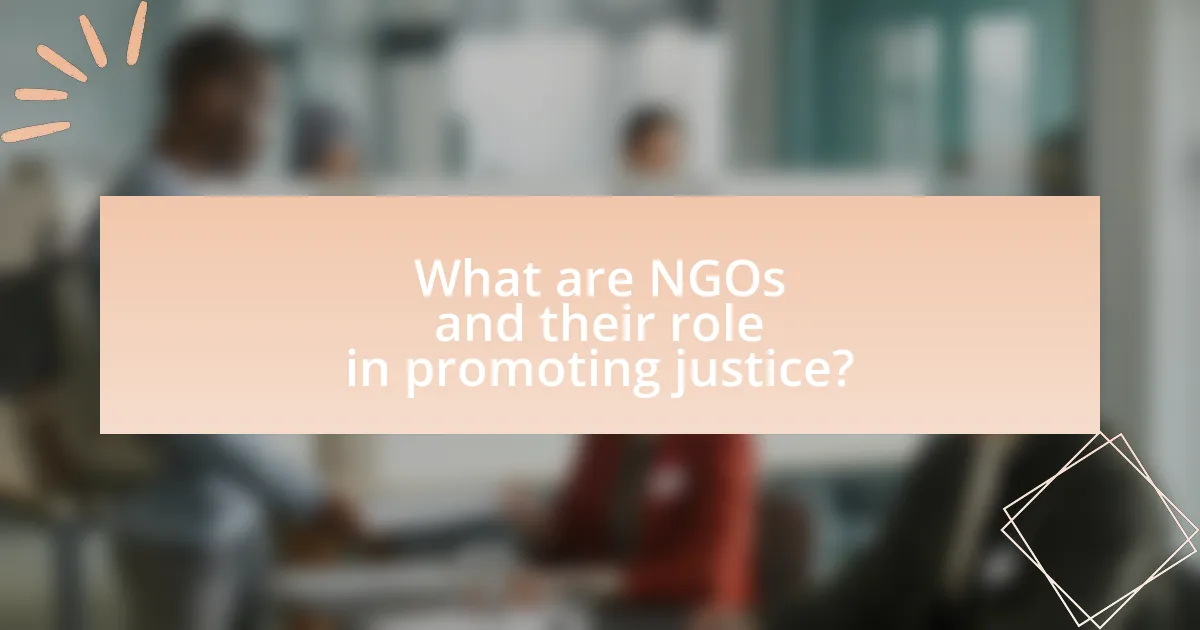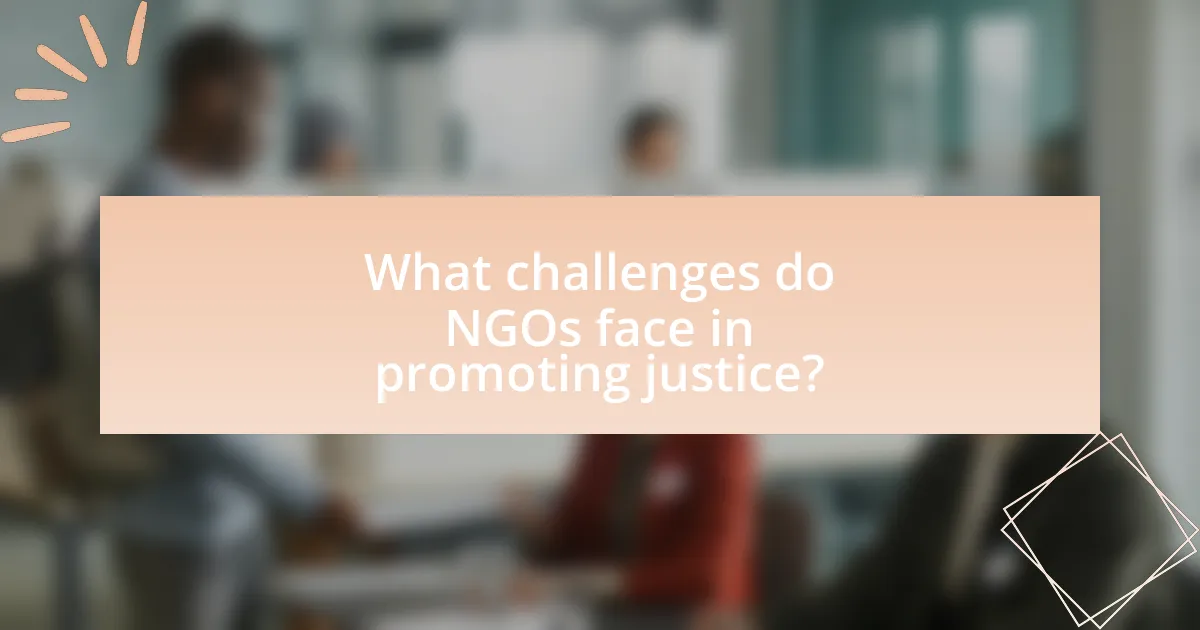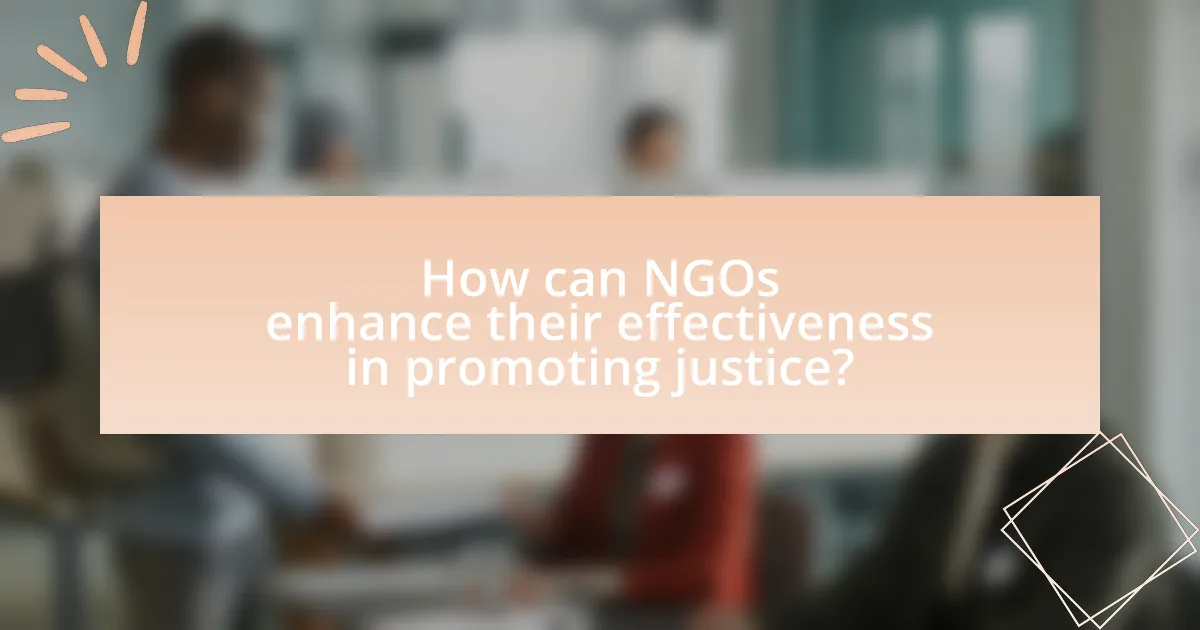Non-Governmental Organizations (NGOs) are independent, non-profit entities that play a vital role in promoting justice by advocating for human rights, providing legal assistance, and raising awareness about social injustices. This article analyzes the effectiveness of NGOs in various aspects, including their contributions to social justice initiatives, specific activities they engage in, and the challenges they face, such as funding issues and political barriers. It also explores how NGOs can enhance their impact through community engagement, strategic partnerships, and data-driven decision-making, while highlighting successful case studies that demonstrate their influence on legal and social reforms.

What are NGOs and their role in promoting justice?
Non-Governmental Organizations (NGOs) are independent, non-profit entities that operate outside of government control, primarily focused on addressing social, political, and environmental issues. Their role in promoting justice includes advocating for human rights, providing legal assistance, and raising awareness about injustices. For instance, organizations like Amnesty International and Human Rights Watch actively document human rights abuses and lobby for policy changes, influencing legislation and public opinion. According to the World Bank, NGOs contribute significantly to social justice by empowering marginalized communities and facilitating access to resources, thereby enhancing accountability and transparency in governance.
How do NGOs contribute to social justice initiatives?
NGOs contribute to social justice initiatives by advocating for marginalized communities, raising awareness about social issues, and providing essential services. They often engage in policy advocacy to influence legislation that promotes equality and human rights, such as the work of Amnesty International in campaigning against human rights abuses. Additionally, NGOs like Oxfam provide direct support through programs aimed at alleviating poverty and empowering disadvantaged groups, which is crucial for fostering social equity. Their efforts are supported by research indicating that NGOs play a significant role in mobilizing grassroots movements and facilitating community engagement, thereby enhancing the effectiveness of social justice initiatives.
What specific activities do NGOs engage in to promote justice?
NGOs engage in various specific activities to promote justice, including advocacy, legal assistance, education, and community mobilization. Advocacy involves lobbying for policy changes and raising awareness about injustices, which can influence legislation and public opinion. Legal assistance provides support to individuals facing legal challenges, ensuring access to justice for marginalized groups. Education initiatives aim to inform communities about their rights and legal processes, empowering them to seek justice. Community mobilization encourages collective action to address local injustices, fostering solidarity and resilience among affected populations. These activities are essential for creating systemic change and enhancing the rule of law.
How do NGOs collaborate with other organizations to enhance their impact?
NGOs collaborate with other organizations through partnerships, resource sharing, and joint initiatives to enhance their impact. These collaborations allow NGOs to leverage each other’s strengths, such as expertise, funding, and networks, which can lead to more effective program implementation and broader outreach. For instance, a study by the World Bank in 2020 highlighted that NGOs working with local governments and community organizations increased their project success rates by 30% due to shared resources and local knowledge. This synergy not only amplifies the reach of their initiatives but also fosters sustainable development by aligning goals and strategies across different sectors.
Why is the effectiveness of NGOs in promoting justice important?
The effectiveness of NGOs in promoting justice is important because they play a crucial role in advocating for human rights, providing essential services, and holding governments accountable. NGOs often fill gaps in governmental efforts, especially in areas where state mechanisms are weak or corrupt, thereby ensuring that marginalized voices are heard and that justice is pursued. For instance, according to a report by the World Bank, NGOs have been instrumental in advancing legal reforms and improving access to justice in various countries, demonstrating their impact on systemic change. Their ability to mobilize communities and influence policy decisions further underscores their significance in the global pursuit of justice.
What metrics are used to evaluate the effectiveness of NGOs?
Metrics used to evaluate the effectiveness of NGOs include outcome measurement, impact assessment, financial efficiency, stakeholder satisfaction, and program reach. Outcome measurement assesses the specific changes resulting from NGO activities, while impact assessment evaluates the broader effects on communities or target populations. Financial efficiency examines how well NGOs utilize their resources, often measured by the ratio of program expenses to total expenses. Stakeholder satisfaction gauges the perceptions and experiences of beneficiaries and partners, and program reach quantifies the number of individuals or communities served. These metrics provide a comprehensive framework for assessing NGO effectiveness in promoting justice and achieving their missions.
How does public perception influence the effectiveness of NGOs?
Public perception significantly influences the effectiveness of NGOs by shaping their credibility, funding opportunities, and overall impact. When the public views an NGO positively, it often leads to increased donations and volunteer support, which are crucial for operational success. For instance, a 2020 study by the Charities Aid Foundation found that organizations perceived as trustworthy received 50% more in donations compared to those with negative public sentiment. Additionally, favorable public perception can enhance an NGO’s ability to advocate for policy changes, as seen in campaigns like the Ice Bucket Challenge, which raised awareness and funds for ALS research, demonstrating how public engagement can amplify an NGO’s mission.

What challenges do NGOs face in promoting justice?
NGOs face significant challenges in promoting justice, including limited funding, political resistance, and operational constraints. Limited funding restricts their ability to implement programs effectively, as many NGOs rely on donations and grants that may not be consistent or sufficient. Political resistance often manifests through government pushback, legal restrictions, or hostility towards their activities, which can hinder their advocacy efforts. Operational constraints, such as lack of access to necessary resources, skilled personnel, or technology, further impede their capacity to address justice issues comprehensively. These challenges collectively undermine the effectiveness of NGOs in achieving their justice-related goals.
How do funding issues affect NGO operations?
Funding issues significantly hinder NGO operations by limiting their ability to implement programs and sustain staff. When NGOs face financial constraints, they often have to reduce the scope of their activities, leading to fewer services provided to communities. For instance, a report by the International NGO Training and Research Centre indicates that 70% of NGOs reported project delays due to funding shortages, which directly impacts their effectiveness in promoting justice. Additionally, funding instability can result in high staff turnover, as employees may seek more secure positions elsewhere, further disrupting ongoing initiatives.
What are the implications of reliance on donor funding?
Reliance on donor funding can lead to a lack of sustainability for NGOs, as they may become dependent on external financial support rather than developing self-sufficient revenue streams. This dependency can result in mission drift, where organizations prioritize donor interests over their core objectives to secure funding. For instance, a study by the Overseas Development Institute found that NGOs heavily reliant on donor funding often face challenges in maintaining their original mission, as they adapt their programs to align with donor priorities. Additionally, donor funding can create power imbalances, where donors exert influence over the direction and operations of NGOs, potentially undermining local ownership and accountability.
How can NGOs diversify their funding sources?
NGOs can diversify their funding sources by exploring multiple avenues such as grants, individual donations, corporate sponsorships, and social enterprises. For instance, according to the National Council of Nonprofits, over 30% of nonprofit funding comes from individual donations, highlighting the importance of building a strong donor base. Additionally, NGOs can apply for government and foundation grants, which accounted for approximately 15% of nonprofit revenue in 2020, as reported by the Urban Institute. Engaging in partnerships with businesses for sponsorships can also provide financial support while enhancing visibility. Lastly, establishing social enterprises allows NGOs to generate income through services or products, creating a sustainable funding model.
What political and legal barriers do NGOs encounter?
NGOs encounter significant political and legal barriers that hinder their operations and effectiveness. These barriers include restrictive laws that limit funding sources, such as regulations that require NGOs to disclose foreign funding or impose heavy taxation on donations. For instance, in countries like Hungary and Russia, legislation has been enacted that targets foreign-funded NGOs, labeling them as “foreign agents,” which can lead to increased scrutiny and operational challenges. Additionally, political hostility from government entities can manifest in harassment, intimidation, or even the outright closure of NGOs that challenge state policies or advocate for human rights. In Egypt, for example, NGOs face stringent registration processes and can be subject to criminal charges for operating without government approval. These political and legal obstacles not only restrict the activities of NGOs but also create an environment of fear that can deter potential supporters and volunteers.
How do government regulations impact NGO activities?
Government regulations significantly impact NGO activities by determining their operational scope, funding sources, and compliance requirements. For instance, regulations can restrict the types of projects NGOs can undertake, as seen in countries with stringent laws that limit foreign funding, thereby affecting their ability to operate effectively. In India, the Foreign Contribution Regulation Act (FCRA) mandates that NGOs must register and obtain government approval to receive foreign donations, which has led to a decline in funding for many organizations. Additionally, compliance with reporting and transparency requirements can strain resources, diverting attention from core missions. These regulations can either facilitate or hinder NGOs’ ability to promote justice, depending on their nature and implementation.
What strategies can NGOs employ to navigate political challenges?
NGOs can employ strategies such as building coalitions, engaging in advocacy, and leveraging public awareness campaigns to navigate political challenges. Building coalitions with other organizations enhances collective power and influence, as seen in the collaboration of various NGOs during the 2011 Arab Spring, which amplified their voices against oppressive regimes. Engaging in advocacy involves lobbying policymakers and participating in legislative processes, a strategy effectively utilized by organizations like Amnesty International to influence human rights legislation. Additionally, leveraging public awareness campaigns can mobilize community support and pressure political entities, exemplified by the global response to climate change led by NGOs like Greenpeace, which successfully raised awareness and prompted political action. These strategies demonstrate how NGOs can effectively address and overcome political obstacles.

How can NGOs enhance their effectiveness in promoting justice?
NGOs can enhance their effectiveness in promoting justice by implementing targeted advocacy strategies that address specific injustices. By conducting thorough research and gathering data on social issues, NGOs can create evidence-based campaigns that resonate with policymakers and the public. For instance, the International Justice Mission has successfully utilized data on human trafficking to influence legislation and increase funding for victim support services. Additionally, fostering partnerships with local communities and other organizations amplifies their reach and impact, as seen in the collaboration between Amnesty International and grassroots movements to promote human rights. These approaches not only strengthen the credibility of NGOs but also ensure that their initiatives are aligned with the needs of the communities they serve.
What best practices can NGOs adopt for better outcomes?
NGOs can adopt best practices such as establishing clear goals, engaging stakeholders, and utilizing data-driven decision-making for better outcomes. Clear goals provide direction and measurable objectives, which enhance accountability and focus efforts. Engaging stakeholders, including beneficiaries and local communities, ensures that programs are relevant and culturally appropriate, leading to increased support and participation. Data-driven decision-making allows NGOs to assess the effectiveness of their initiatives, adapt strategies based on evidence, and demonstrate impact through quantifiable results. For instance, a study by the Global Fund for Community Foundations found that NGOs employing these practices reported a 30% increase in project success rates compared to those that did not.
How can NGOs leverage technology to improve their effectiveness?
NGOs can leverage technology to improve their effectiveness by utilizing data analytics, digital communication tools, and online fundraising platforms. Data analytics enables NGOs to assess community needs and measure the impact of their programs, leading to informed decision-making. Digital communication tools, such as social media and mobile applications, facilitate outreach and engagement with stakeholders, enhancing transparency and accountability. Online fundraising platforms increase financial support by reaching a broader audience, allowing NGOs to sustain and expand their initiatives. For instance, a report by the Stanford Social Innovation Review highlights that organizations using data-driven strategies saw a 30% increase in program effectiveness.
What role does community engagement play in NGO success?
Community engagement is crucial for NGO success as it fosters trust, enhances program relevance, and increases resource mobilization. Engaging with the community allows NGOs to understand local needs and tailor their initiatives accordingly, which leads to higher participation rates and better outcomes. For instance, a study by the World Bank found that NGOs with strong community ties are 50% more likely to achieve their project goals compared to those with minimal engagement. This connection not only improves service delivery but also encourages community ownership of projects, ensuring sustainability and long-term impact.
What are some successful case studies of NGOs promoting justice?
Successful case studies of NGOs promoting justice include the work of Human Rights Watch, which documented human rights abuses in various countries, leading to international pressure and policy changes. Another example is the International Justice Mission, which has rescued thousands from human trafficking and secured convictions against perpetrators, demonstrating the effectiveness of legal advocacy. Additionally, the American Civil Liberties Union has successfully challenged unjust laws and practices in the U.S., resulting in landmark Supreme Court decisions that protect civil liberties. These cases illustrate how NGOs can drive significant legal and social reforms through advocacy, documentation, and direct intervention.
What lessons can be learned from these successful NGOs?
Successful NGOs demonstrate the importance of community engagement in achieving their goals. By actively involving local populations in decision-making processes, these organizations ensure that their initiatives are relevant and effective. For instance, the Grameen Bank, which focuses on microfinance, has shown that empowering individuals through financial literacy and support leads to sustainable economic development. Additionally, successful NGOs often emphasize transparency and accountability, which fosters trust and encourages donor support. The World Wildlife Fund, for example, has built a strong reputation by openly sharing its financial reports and project outcomes, which has enhanced its credibility and effectiveness in conservation efforts. These lessons highlight the critical role of collaboration, transparency, and community involvement in the success of NGOs.
How can these lessons be applied to other NGOs?
Lessons learned from effective NGOs can be applied to other NGOs by implementing strategic planning, community engagement, and data-driven decision-making. For instance, NGOs that prioritize strategic planning often achieve clearer objectives and better resource allocation, as evidenced by the success of organizations like Amnesty International, which has effectively mobilized resources to address human rights issues. Additionally, fostering community engagement allows NGOs to tailor their initiatives to the specific needs of the populations they serve, enhancing program relevance and impact, as demonstrated by local NGOs that have successfully increased participation rates through grassroots outreach. Lastly, utilizing data-driven decision-making enables NGOs to assess program effectiveness and adapt strategies based on measurable outcomes, a practice that has led to improved accountability and transparency in organizations such as Oxfam. These approaches collectively enhance the operational effectiveness of NGOs in promoting justice.
What practical steps can NGOs take to improve their impact on justice?
NGOs can improve their impact on justice by implementing targeted advocacy strategies, enhancing community engagement, and utilizing data-driven approaches. Targeted advocacy strategies involve identifying specific legal reforms or policy changes needed in the justice system and mobilizing resources to influence decision-makers effectively. For instance, organizations like Human Rights Watch have successfully campaigned for legislative changes by presenting well-researched reports that highlight injustices.
Enhancing community engagement ensures that NGOs understand the needs and perspectives of the populations they serve, which can lead to more relevant and effective interventions. Programs that involve local communities in decision-making processes have shown to increase trust and cooperation, as evidenced by the success of community-based justice initiatives in various countries.
Utilizing data-driven approaches allows NGOs to measure their impact quantitatively and qualitatively, enabling them to adjust strategies based on evidence. For example, the use of impact assessments and monitoring tools can help organizations like the International Justice Mission track progress and refine their methods to achieve better outcomes in justice delivery.